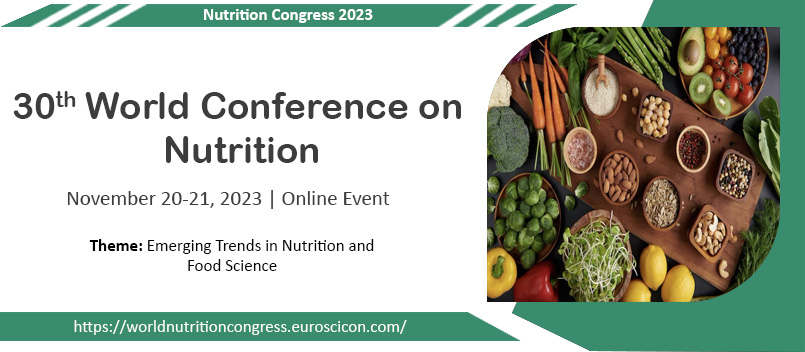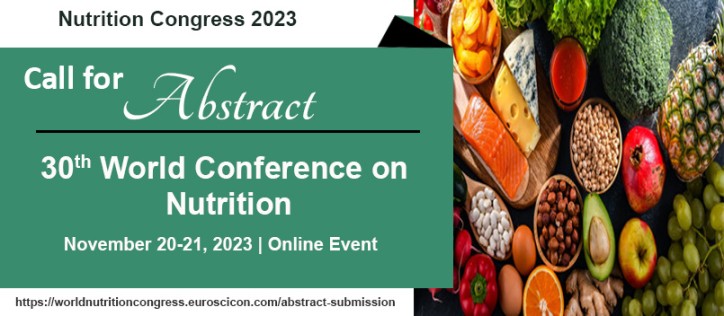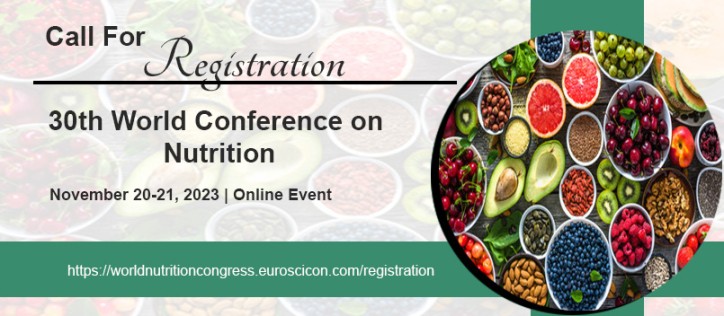Nutrition Congress 2023
About Conference
About Conference:
Euroscicon Ltd offers all the participants from all over the Globe to attend “30th World Nutrition Congress” during November 20-21, 2023 Online | Webinar. It includes prompt Keynote presentations, Oral presentations (Speaker forum and young research forum), Poster presentations, and Exhibitions. It will bring all the Scientists, Professors, Businesspeople and Delegates together for a remarkable success.
The Theme of the Conference is "Emerging Trends in Nutrition and Food Science". The main goal of the conference is to bring together all the top academic researchers, doctors of all specialties, nutritionists, dieticians, researchers, and research scholars to discuss all facets of nutritional science, food science, and health care. Additionally, it gives academics, practitioners, and educators the best interdisciplinary arena for presenting and debating the most recent advancements, trends, and issues, as well as the real-world difficulties they have faced and the solutions they have chosen in the fields of nutrition, healthcare, and food sciences. The conference programmed will cover a wide range of subjects related to food science, pediatrics nutrition, nutrigenomics, functional foods, obesity, and nutritional science in general.
Importance & Scope of World Nutritional Congress:
30th World Nutritional Congress is focused on learning about nutrition, diet and food and its advances; this is your best opportunity to reach best nutritionist, doctors, nutritional technicians, dieticians, clinical nutritionists, registered dieticians, Food technologist, Food and nutritional scientist, Health care product developers and researchers and the largest assemblage of participants from the Nutritional and Food Science Community. Our World Nutritional congress conference planned to keep in mind the best scientific sessions, exhibitions, poster presentations, oral presentations, workshops, symposiums, and great keynotes. World-renowned speakers, the most recent techniques, developments and the newest updates in Nutrition and Food Science are hallmarks of our conference.
Why to Attend?
30th World Nutritional Congress is intended to provide an outstanding opening to the experts in the field of nutrition to discuss latest research and challenges. 30thWorld Nutritional Congress is planned to provide a special podium for nutritionist, doctors, clinical nutritionists, registered dieticians, and other health-care professionals, researchers and students working in the field to consciously, exchange visions and their understandings in front of a large intercontinental listeners. This World Nutritional 2023 conferences or rather all Nutrition conferences, Nutrition events and Nutrition meetings will help in intermingling with different brains in nutrition and dietetics throughout the world, B2B construction between specialists and academicians. The companies dealing with nutritional products and supplements can exhibit their products in the Nutrition exhibition and expo.
Target Audience:
- Clinical Nutritionists
- Pediatric Specialist
- Pregnancy Doctors
- Nutritional Microbiologist
- Doctors in all Specialization
- Public Health Nutritionist
- Sports Nutritionist
- Functional Food Developers and Organization
- Nutritional Advocates
- Obesity Advocates
- Registered Dietitians
- Health-Care Professionals
- Researchers and Scientists
- Training Institutes
- Universities and Colleges Students
- Nutrition and Dietetics Associates
- Nutrition and Dietetics based Companies.
- Business Entrepreneurs
Reasons to Attend world Nutrition Congress 2023:
1. To Grow Your Professional Network
2. Meet Experts & Influencers in Your Field
3. Live Interaction with Like Minded People
4. Share Your Content
5. Learn New Things
6. Grow Your Self
7. Conference CE/ CPD
8. Continuing Education
9. Global Reach & Highest Visibility
10.Workshops, Symposiums, and Exhibitions
SESSIONS & TRACKS
Track 1: Nutrition and Dietetics:
The complexity of the health care system has increased because of the developing scientific breakthroughs. The key to good physical and mental health is proper eating. A variety of plant- and animal-based meals can satisfy the requirements for a balanced diet. At every stage of life, a person needs to eat well. To provide us with the energy we need to develop, learn, work, and maintain our health, our bodies require an adequate supply of the correct meals. Due to their rapid physical development even before birth, children under the age of two have unique needs. since being ill can impair how well we are eating.
Track 2:Nutrition and Food:
We obtain energy for our bodies from food and nutrients. Every day, we need to replenish the nutrients already present in our bodies. To maintain good health, it's crucial to consume essential vitamins and minerals. When picking items to eat and potential dietary supplements, it's crucial for pregnant women and adults to take vitamins like vitamin D and minerals like calcium and iron into account.
Natural foods make up a large portion of a balanced diet. The process of nutrition covers everything from ingesting food to utilizing it in various bodily processes. What nutrients we need, in what amounts, how to get them, and how the body uses them are all topics covered by nutrition science.
Track 3: Pediatrics Nutrition:
The fundamental feature of childhood is growth, which is also a sensitive measure of the child's nutritional state. Pediatric nutrition aids in the maintenance of a suitable, well-balanced diet that includes the necessary nutrients and calories to support growth and maintain physiologic requirements at different stages of a child's development.
Pediatric nutritional requirements are closely tied to development rate and vary greatly with age, degree of activity, and environmental factors. Breastfeeding contains vital nutrients that aren't included in any infant formula and helps the child's immune system develop.
Essential vitamins and minerals that support growth and development must be included in pediatric nutrition. The building blocks primarily needed for the formation of the body are proteins.
Track 4: Sports Nutrition:
Everything you eat throughout the day, not simply what you eat or take in as a supplement when you exercise or compete, should be considered as part of your sports nutrition. It is important to remember that knowing when and what to eat each day will have a significant impact on your performance, emotions, sleep, health, and energy levels.
Undoubtedly, diet influences almost all bodily functions that involve the production and use of energy during exercise. The usage of supplements like proteins and the metabolism of lipids, as well as their effects on human performance and health, is a particularly fascinating area in sports nutrition. Minerals and trace elements are essential for creating muscle.
Studies in sports nutrition concentrate on the type and amount of food and liquids consumed.
Track 5: Plant and Animal Nutrition:
A few crucial nutrients are also necessary for plants to grow. Typically, plants consume their sustenance in the form of inorganic substances. A plant typically receives nutrition from the soil and energy from photosynthesis. A variety of processes can interact to produce nutrients from soil, which ultimately gives plants what they need to flourish. Numerous chemical processes must be carried out to produce the nutrients in plant nutrition. Micro and macro nutrients are also necessary for plants to grow healthily. The management of plant development can be measured or estimated with the use of chemical processes that occur during the production of nutrients from inorganic components in the soil.
Track 6: Nutrification:
Nutrification is nothing more than enhancing food by adding nutrients at a level where they significantly impact the diet. Nutrification heavily relies on fortification. Fortification is the technique of adding micronutrients to meals when regional soil causes staple foods to lack certain nutrients. Food fortification is a public health intervention that was started to replenish the nutrients lost during product manufacture, to assure the nutritional equivalent of substitute foods, and to provide the right vitamin and mineral contents.
To cure or avoid certain nutritional deficiencies in the population or in groups at risk for certain deficiencies, it is important to maintain the nutritional quality of foods and keep nutrient levels acceptable. Food fortification is socially acceptable because it doesn't compel people to change their eating habits. Fortification techniques include bio-fortification, home fortification, and commercial and industrial fortification. Restoration, standardization, and supplementation are all parts of fortification. Efficacy trials, iron fortification, vitamin A fortification, multiple fortifications, iodine fortification, iron fortification, combined fortification with iodine and iron, folic acid fortification, fortification with other B vitamins, and vitamin D fortification are examples of fortification types.
The stability of nutrients and the processes used to prepare, produce, and package fortified foods will not have an impact on the product's shelf life and, consequently, the nutritional overages. The level of overage will be determined by the rate of nutritional deterioration in food and the length of the shelf life. A huge section of the population, including the wealthy and the poor, may have their nutritional status improved by fortification, which is readily available and consumed in food.
Track 7: Nutri-genetics and Nutri-genomics:
The science of nutritional genomics, which identifies how diet and food components affect gene expression, is known as nutrigenomics. This aids in finding and comprehending the molecular level interactions between dietary bioactive and the genome that involve nutrients. By connecting gene expression to nutrient absorption, metabolism, excretion, and physiologic impacts, nutrigenomics affects the genetic variety in nutrition. In general, nutrigenomics seeks to create and comprehend how the entire body reacts to food while enhancing reasonable methods to optimize nutrition about genotype. Nutrigenomics is the result of a single food and a single gene.
Because nutrigenomics represents the intersection of health, diet, and genomics—a combination of molecular nutrition and genomics—it will result in dietary intervention techniques for regaining health and fitness and for preventing diet-related disease. The genetic revolution is shedding new light on a variety of medical issues, including how food can help prevent cancer. It is also anticipated that genomic research would lead to novel treatments that are more precisely tailored to the underlying molecular causes of disease. Nutrigenomics, which combines molecular nutrition with genomics, describes how nutrients control gene and protein expression and eventually affect cellular metabolism.
Nutrigenomics employs cutting-edge technology to analyses biological systems at the molecular and cellular level to determine what can function in our bodies. Additionally, new technologies can detect cell signatures that indicate environmental exposure and look at the early alterations in disease processes. Additionally, nutrigenomics might suggest which genes may have significant polymorphisms; these genes can then be further investigated in epidemiological investigations. the investigation of these individual variances, how they interact with diet, and how they relate to health and disease.
Track 8: Functional foods and Nutraceuticals:
Both plant and animal sources can be used to create functional foods. The effects of processing functional foods include the commercialization of nutraceutical food products, management of allergens and the processing of allergen-free foods. Traditional foods have a high level of functional qualities. A balanced diet and regular exercise are essential components of a healthy lifestyle overall, which also includes useful foods for health.
Functional foods benefit us by having an antioxidant effect, an effect on cell differentiation, an increase in the activity of enzymes that detoxify carcinogens, an inhibition of N-nitrosamine formation, a change in estrogen metabolism, a change in the environment in the colon, a preservation of the integrity of intracellular matrices, an effect on DNA methylation, a maintenance of DNA repair, an increase in cancer cell apoptosis, and a decrease in cancer cell proliferation. When consumed as a part of a balanced diet and healthy lifestyle, functional foods have a significant potential to enhance health and aid in the prevention of specific diseases.
Track 9: Pregnancy Nutrition:
Pregnancy is a time when a healthy diet is crucial. To meet the additional demands of your body and those of your developing kid, a good diet is essential. Understanding the proper serving size is another aspect of healthy eating. The future health of the baby depends on providing the right nutrients to support their growth and on them keeping a healthy weight.
With a few exceptions, the dietary guidelines for women before and throughout pregnancy are quite comparable to those for other adults. The major suggestion is to follow the Balance of Good Health model's guidelines for a healthy, balanced diet. It is generally known that diet during pregnancy plays a crucial influence on the health of the mother and her unborn children, including results in later adulthood. If maintained during pregnancy, excellent preconception nutrition encourages ideal fetal growth and development.
To lower the danger of exposure to toxins that could harm the developing baby, pregnant women are recommended to pay close attention to food hygiene during pregnancy and to avoid eating certain foods. Alcohol, large doses of various dietary supplements, food viruses, toxic food components, and other chemicals have the potential to be dangerous.
Track 10: Nutrition and Disease Management:
Diet and nutrition play a significant role in promoting and maintaining good health throughout the lifespan. They play a significant role in preventative efforts because their influence on the development of chronic diseases is well known.
Globally, the burden of chronic diseases is rising quickly. Cardiovascular illnesses account for about half of all chronic disease deaths. Obesity and diabetes are also exhibiting concerning tendencies, not only because they currently impact a significant section of the population but also because they have started to manifest earlier in life.
Chronic conditions may usually be avoided. Even while more fundamental studies may be required on specific elements of the mechanisms that connect diet to health, the scientific evidence that is already available is sufficient. Disease management is an alternative to conventional patient care that promotes collaboration among a group of medical professionals to help patients with certain conditions get the greatest results in terms of their health.
Track 11: Nutrition, Health and Wellness:
To promote health and treat disease, it is crucial to engage in physical exercise, good eating, and other lifestyle behaviors. From disease prevention to achieving your athletic objectives, proper diet is essential for overall health. This enables us to pinpoint a method for obese and overweight adult and pediatric patients that combines nutrition, exercise, behavioral modification, surgery, and medication.
Benefits of exercise are described in nutrition, health, and wellness, which also creates programs. how to help patients identify the elements of a healthy diet. Identify beneficial diet and nutrition practices. to comprehend the significance of healthcare provider burnout and solutions to the issue
Track 12: Diabetes Nutrition and Diet:
A crucial aspect of diabetic care is nutrition. Maintaining a healthy diet and way of life involves finding the proper ratio of carbohydrates, fats, and proteins, as well as fiber, vitamins, and minerals. Diabetes patients have blood sugar levels that are excessively high. Keeping your blood sugar level under control is treating diabetes. What you eat has a direct impact on how much sugar is in your blood. Making the appropriate dietary selections will assist you in maintaining blood sugar management.
Diabetes patients' dietary therapy is frequently reliant on the assumptions or judgements of the medical treatment provider. People who have diabetes frequently find this frustrating or perplexing since, while hearing or reading that they should ideally be on a low-carbohydrate diet, other sources advise them to consume a high-carbohydrate, high-protein, or low-fat diet.
An important component of the management of all types of diabetes is the modification of harmful lifestyle variables. For the prevention of macro vascular disease, it's crucial to control cardiovascular risk factors like smoking, inactivity, and poor diet well. Negative lifestyle choices, such as smoking, can have an impact on microvascular problems. The patient's willingness to change, how they perceive their diabetes, and other indirect diabetes-related problems like depression and poor quality of life should all be considered when assisting patients in changing behavior.
Track 13: Health Impact of Nutritional, Physical activity and Obesity:
A person's entire health and well-being depend heavily on proper nutrition, exercise, and a healthy body weight. A person's risk of acquiring significant health disorders like high blood pressure, high cholesterol, diabetes, heart disease, stroke, and cancer can be reduced because of these factors taken together. For health issues to be managed so they do not get worse over time, a good diet, frequent exercise, and obtaining and maintaining a healthy weight are also essential.
It is impossible to overstate the positive effects on health that a healthy diet and regular exercise have. Healthy eating habits and regular exercise can help people reach and maintain a healthy weight, lower their risk of heart disease and stroke, decrease their risk of developing some types of cancer, strengthen their muscles, bones, and joints, and improve their mood and energy levels.
Chief among the benefits of a healthful diet and physical activity is a reduction in the risk of obesity. Obesity is a major risk factor for several of today’s most serious health conditions and chronic diseases, including high blood pressure, high cholesterol, diabetes, heart disease and stroke, and osteoarthritis. Obesity also has been linked to many forms of cancer.
Track 14: Enteral and Parenteral Nutrition:
Any feeding technique that delivers some or all a person's caloric needs through the GI system is referred to as enteral nutrition. A typical oral diet, the use of liquid supplements, or the delivery of some or all of the daily needs using a tube are all examples of this. Parenteral nutrition describes the process of injecting nutrients and calories into a vein. This might be as easy as carbohydrate calories being administered intravenously as simple sugar, or all necessary nutrients could be given.
Track 15: Body Weight Management:
Energy balance, as defined by nutritionists, is what determines a person's weight. Energy balance basically refers to the link between your daily, weekly, and monthly calorie intake and expenditure. You will acquire weight if your energy intake exceeds your energy expenditure. In contrast, you will lose weight if your calorie intake is lower than your energy expenditure.
Techniques for managing one's weight include long-term lifestyle choices that encourage a healthy diet and regular exercise. Effective weight-management techniques consider both weight loss and the long-term maintenance of a healthy body weight. Fad diets that encourage rapid, transient weight loss are not a part of weight control. It focuses on the long-term outcomes brought about by gradual weight loss, followed by maintenance of an ideal body weight for age, sex and height.
Track 16: Allergy and Nutrition:
Around the world, food allergies are a growing issue; it is thought that 6-8% of children may have them at some point during their childhood. It is crucial to understand that the nutritional consequences include not only the removal of necessary foods from the diet and the resulting lack of energy, protein, or other macro or micronutrients, including vitamins, but also the undiagnosed or improperly handled illnesses.
It has been demonstrated that diet and nutrition are becoming more important in allergic illnesses. While over the counter and prescription medications only mask allergy symptoms, a healthy diet can boost your immune system and prevent allergy attacks. increases the chance of inadequate nutrition and stunted growth. Providing wholesome food might be difficult. A food allergy may make you more stressed.
Track 17: Cellular and Molecular Nutrition:
The goal of cellular and molecular research is to increase knowledge of the causes and mechanisms of disease. These findings help assess the effectiveness of both therapeutic and preventative nutritional interventions, and they eventually give rise to more logical methods of disease prevention and management. Additionally, it aids in identifying the gene-nutrient interactions as well as the mechanisms through which dietary elements affect disease processes, both of which serve as the cornerstones of the area of nutrition science.
Track 18: Nursing Nutrition:
To avoid sickness, recover from illness, and maintain good health, proper nutrition is crucial. You will feel and look better with a nutritious diet. Nurses must comprehend the significance of nutrition fundamentals and be able to inform patients about healthy eating options because they are the primary point of contact with patients. Nutrition education seminars give students the knowledge they need to separate fact from fiction regarding healthy eating and impart that knowledge to their patients.
Nurses can initiate nutritional treatment in the right way only with the help of education. The screening, assessment, planning, execution, and evaluation of nutritional care must all be covered in nursing courses. A solid foundation in nutritional science fundamentals is necessary to understand the rationale behind the components of nutritional care.
Track 19: Nutritional Endocrinology:
Endocrine disorders bring to light the significance of hormonal and dietary elements in the control of human metabolism. The nutritional changes have a profound impact on all facets of the endocrine glands' operation, which might result in significant illnesses. Classic deficiency diseases including goiter, cretinism, hypothyroidism, and rickets dominated the 20th century. Obesity, metabolic syndrome, and diabetes are just a few examples of the several nutritional endocrine problems that are on the rise because of industrialization and the increased availability of junk food.
Since the dawn of time, endocrinology and nutrition have been intertwined under the theory that development in stature depends on proper nourishment. Later, the recognition of thyroid conditions brought on by iodine shortage broadens the scope. The relationship between childhood obesity and its effects on metabolism in adult life has been a matter of great concern during the last couple of decades.
The adoption of healthy eating practices is essential in the efforts to improve health and prevent disease. Radical reforms and public education are important involving all the stakeholders to devise policies to overcome the burden of nutritional endocrine disorders.
Track 20: Nutritional Immunology:
In addition to having a significant impact on an organism's health, wellbeing, and ability to reproduce, nutrition plays a crucial role in immunological defense and pathogen resistance. It also has important ecological and evolutionary implications. Infectious disease-related morbidity and mortality are significantly influenced by undernutrition. Conversely, metabolic disorders linked to overnutrition can impair immune function, disrupt the symbiotic and commensal microbiota relationship, and increase susceptibility to infection.
Identification of novel plant-derived chemicals with anti-inflammatory and anti-diabetic properties, Identification of novel molecular targets that mediate the effects of dietary components and botanicals on inflammation and immunity, studying the effects of nutrition on the gut microbiome and mucosal immune responses, and identifying the modulation as potential molecular targets for dietary and naturally occurring chemicals.
Track 21: Nutrition and Cardiovascular Disease:
Atherosclerosis and hypertension, two conditions that are deeply influenced by diet and that can be treated, at least in part, from a nutritional point of view, are at the core of the major cardiovascular diseases that strike the developed world. The same is true for the "epidemic" of obesity that is on the rise. Diet is made up of a variety of nutrients, some of which may interact with one another.
The definitive study of nutrients and their impact on cardiovascular disease can be a daunting enterprise. Many dietary risk factors contribute to these diseases in various environmental and ethnic settings. These risk factors are often in evidence in youth so that preventive measures must be initiated early in life.
Heart failure, stroke, coronary sickness, and other problems that affect the heart and veins are examples of cardiovascular disorders. It is unmistakably linked to other chronic infections, such as dementia, diabetes, and renal disease. Atherosclerosis, thrombosis, and irritation are the primary pathologic types. Increased circulatory strain, an atherogenic blood lipid profile, and decreased glucose resistance are examples of modifiable natural hazard factors.
Track 22: Nutrition and Cancer Research:
The area of research into how nutrition affects the development of cancer is vast. As science advances, it is becoming more evident that nutrition plays a significant role in cancer. The American Institute for Cancer Research and the World Cancer Research Fund estimate that healthy diets, regular exercise, and maintenance of a healthy weight can prevent 30 to 40 percent of all malignancies. For some specific tumors, it most likely exceeds this level.
Most of the research on nutrition and cancer has been reductionist, meaning it has focused on a specific food or nutrient's effects on tumor formation/regression or another cancer end point at a specific place in the body. These investigations are particularly beneficial for understanding the specifics of disease mechanisms.
They do not, however, provide a comprehensive picture of how nutrition can be used to prevent cancer. Even less, they provide scant guidance on what to eat if someone already has cancer and wants to follow a diet that will help them recover.
Track 23: Nutritional Epidemiology:
A growing body of research showing a connection between diet and common chronic diseases has sparked new studies in nutritional epidemiology that support a wide range of strategies, including detailed dietary analysis, the prevention of disordered eating, research into obesity, physical activity, and cancer etiology and more.
Nutrition epidemiology is the study of how nutrition affects human health. A few decades ago, a minor subfield of the study of disease transmission was transformed into a stream with significant public health significance. The purpose for nutritional advice has been the prevention of illnesses since nutritional deficits have been significantly reduced in most exceptional nations. Physical activity evaluation in nutritional epidemiology. The two most crucial things are nutrition tracking and survival skills. It covers a wide range of subjects, including the evaluation of physical activity in nutritional epidemiology, diet, and nutrients.
Track 24: Precision Nutrition:
Precision nutrition is the link between precision medicine, precision prevention and precision health. Precision nutrition should be part of the normal daily diet to prevent and reduce the beside diseases we see typically in metabolic diseases.
Precision nutrition should be incorporated into medical treatment, prevention strategies, and daily healthy lifestyles, such as ideas about healthy ageing. Precision nutrition should be incorporated into medical treatment, prevention strategies, and daily healthy lifestyles, such as ideas about healthy ageing. Thus, a set of simple strategies to reduce morbidity and prevent disease are provided by precision nutrition research.
Track 25: Role of Nutrition in Neuroscience:
The study of how the body's neuro systems respond to nutrition is known as neuroscience. The brain and the nerves play a significant role in the transmission of signals in our body, so for the system's proper upkeep—which includes cells—minerals, water, and vitamin strength—as well as their appropriate quantities in the body—are necessary. This is because the brain, which consumes 20–25% of our energy, depends on the system's proper operation.
Skin, organs, senses, cells, and all bodily movements require correct signals from the brain to all nerves that travel through the spinal cord. For a stronger and healthier brain and nervous system, nutritional science is acting on the nervous system. As many nutrients, including zinc, vitamins, and minerals, offer the body energy and power, they also maintain a healthy brain and nervous system. Nutrition plays a significant part in neuroscience. However, a great dietician and nutritionist could only assist us with our diet. A balanced diet rich in nutrients will undoubtedly aid in overcoming any form of illness because it serves as a protective mechanism by resisting it.
Track 26: Childhood Obesity:
Obesity among children has reached pandemic proportions in both developed and developing nations. Childhood obesity and overweight are known to negatively affect both physical and mental health. Children who are overweight or obese are more likely to be overweight into maturity and to experience non-communicable diseases like diabetes and cardiovascular disease earlier in life. It is thought that obesity is an illness with several underlying causes because the process underlying its development is not entirely understood.
The global rise in obesity prevalence is mostly due to environmental variables, lifestyle choices, and cultural context. In general, it is believed that increased calorie and fat intake causes overweight and obesity. On the other hand, there is evidence to show that larger portion sizes, excessive sugar consumption in soft drinks, and a continuous drop-in physical activity have been contributing significantly to the global rise in obesity rates.
Children's physical health, social and emotional wellbeing, and self-esteem can all be significantly impacted by childhood obesity. Additionally, it is linked to a child's poorer quality of life and poor academic achievement. Numerous co-morbid illnesses are also observed in association, including metabolic, cardiovascular, orthopedic, neurological, hepatic, pulmonary, and renal disorders.
Track 27: Nutritional Education and Behavioural Science:
Behavioral science and nutritional education illuminate some of the issues and solutions required to assist people in changing their food habits. People would alter their eating habits to improve their health, according to an early theory.
The failure of knowledge-based education alone to alter food behavior is explained by behavioral science. Dietary habits are the outcome of behavioral, individual, familial, societal, and environmental influences, which are referred to as mediating variables combined. It takes a lot of work to create nutrition education programs that are likely to alter eating habits.
Market Analysis
According to new marketing research the report of nutritionary Analysis Market by Parameter, Product kind (Beverages, store & Confectionery, Snacks, farm & Desserts, Meat & Poultry, Sauces, Dressings, Condiments, Fruits & Vegetables, Baby Food) Objective and Region - international Forecast to 2022 the nutritionary analysis market is to achieve USD five.99 Billion by 2022, at a CAGR of eight.2% from 2017.The marketplace for nutritionary analysis is driven because of the increase in shopper awareness, implementation of food safety labeling rules, globalization of food trade, and advancement in technology. The nutrition profile phase dominated the nutritionary analysis market, followed by proteins, in 2016.
The demand for nutrition supplements and food is increasing within the international market. Growth in health aware shoppers preferring food merchandise or supplements with higher nutrition share is fuelling the demand for nutritionary analysis. Proteins is classified by their composition, structure, biological perform, or solubility properties. Food proteins are very complex. Various proteins have been purified and characterized. They vary in molecular mass, starting from around 5000 to quite 1,000,000 Daltons. They are composed of elements including hydrogen, carbon, nitrogen, oxygen, and sulphur
Nutrition analysis refers to the method of crucial the nutritionary content of food. The potable trade is growing with the innovation of merchandise like energy drinks, nutrition fortified water, anti-aging water, and sports drinks. On the other hand, the beverage industry is witnessing challenges such as the compositional quality and safety to be monitored in order to track contamination, adulteration, product consistency, and to ensure regulatory compliance from raw ingredients to the finished product. Nutritional labelling has received considerable attention in the food industry due to increasing consumer interest in health and diet issues. Food labels area unit a supply of data and most frequently the primary means that for directly connecting with a consumer; but, its potential is not always well exploited. Labels could also be associate instrument for reinforcing generic claims and for establishing product differentiation, differentiation across food categories and within a specific category.
Consumers have many selections relating to their food provide, in order that they is selective concerning the merchandise they purchase. The global medical nutrition market has been classified on the basis of product and geography. The key product segments include elderly nutrition, parental nutrition, Pediatric nutrition, and sports nutrition. By geography, the market has been divided into Asia Pacific, North America, Europe, and Rest of the World. The demand, supply, consumption, and expected growth rate of every segment have been discussed at length in the research report. The research report on the global medical nutrition market provides a thorough analysis, focusing on the current trends in the market. The historical performance and projected statistics of the market have also been included in the study, along with a detailed analysis of the key growth prospects and limitations. The study also includes an analysis of the macro and micro factors that will impact the performance of existing and new market players and a detailed value chain analysis to provide a clear picture of the market.
Who to attend
Filled with infinite plenary sessions, workshops and scientific symposiums the Congress is envisioned to provide a special podium for nutritionist, doctors, clinical nutritionists, registered dieticians, and other health-care professionals, researchers and students working in the nutrition prospect. The World Nutritional 2023 conferences will help in fostering different brains in nutrition and dietetics throughout the world, B2B construction between specialists and academicians. The firms producing nutritional and supplements products can exhibit their products in the Nutrition expo 2023.
Learn More
LEARN MORE
Top Nutrition and Food Universities:
Europe Nutrition Universities:
University of Illinois at Chicago | Florida International University |Western Sydney University | Trine University |Nutritional Science Conferences |The University of New Mexico| James Madison University | Okan University |Baylor University| Nutrition Conferences| university of Illinois at Chicago | Van Hall Larenstein | Pediatric Nutrition Conferences | University of Applied Sciences |The University of Vermont | CQ University Australia |Glasgow Caledonian University | University of Tasmania | James Madison University |James Madison University| Nutrition Conferences | Food Conferences | Sports Nutrition Conferences | Nutrification Conferences | Weight Management Conferences | Molecular Nutrition Conferences | Childhood Obesity Conferences | Public Health Nutrition Conferences | Dietetics Conferences | Animal Nutrition Conferences| Taylor's University | Louisiana State University | Nutraceutical Conferences | Louisiana State University | Florida International University | Clinical Nutrition Conferences | University of Saint Joseph | Bath Spa University | Lipscomb University | West Virginia University | Biogenetic Conferences | Eating Disorders Conferences | Long Island University (LIU) | Nutrition and Cancer Conferences| Springfield College| Izmir University of Economics| Washington State University | Colorado State University | Clinical Nutrition Conferences | Food and Nutrition Conferences |York Saint John University | London South Bank University | Nutrition and Dietetics Conferences | Liverpool John Moores University | Sports Nutrition Conferences | University of Westminster | Iowa State University | Food Conferences| Victoria University | Leeds Beckett University | Fitness Conferences | York University | Illinois State University | University of New England Maine | Cal Poly Pomona University | University of Central Missouri | University of Arizona | University of Houston | Food and Nutrition Conferences | University of Minnesota Twin Cities | Seoul National University | Childhood Obesity Conferences| Food Technology Conferences |Gannon University | Liverpool John Moores University | Ohio State University | Florida International University | Shiraz University of Medical Sciences | Cornell University | Nutrition Conferences 2019 USA | University of Glasgow | University of Reading | Molecular Nutrition Conferences | University of Arkansas Fayetteville | Madonna University| Henderson State University | University of Prince Edward Island | Weight Management Conferences | State University of New York Plattsburgh | Nutrification Conferences | Carson-Newman University | Nottingham Trent University | University of Missouri - Columbia | University of Mississippi |Food Science Conferences | Andrews University | The University of Hertfordshire |Obesity Conference | Texas A&M University - Kingsville | University of Arizona | University of British Columbia | Erasmus University College Brussels |World Nutrition, Inc.| World Nutrition | World Nutrition Conferences | WHO | Nutrition - World Health Organization | WHO | Global Nutrition Report - World Health Organization | Nutrition Conferences | Food Conferences | Sports Nutrition Conferences | Nutrification Conferences | Weight Management Conferences | Food Quality Conferences | Molecular Nutrition Conferences | Childhood Obesity Conferences | Public Health Nutrition Conferences | Diabetes Conferences | Carbohydrate Conferences
USA Nutrition Universities:
Texas State University | University of Bridgeport| Nutrition Conferences | Food Conferences | Sports Nutrition Conferences | Nutrification Conferences | Weight Management Conferences | Molecular Nutrition Conferences | Childhood Obesity Conferences | Public Health Nutrition Conferences | Dietetics Conferences | Animal Nutrition Conferences |Virginia Tech | George Mason University | University of Alabama at Birmingham | Sacred Heart University |Food and Nutrition Conferences | University of Tampa| University At Buffalo | Pregnancy Nutrition Conferences | The State University of New York | Fitness Conferences | University of Kentucky | Iowa State University | University of Illinois At Chicago | Food Science Conferences | University of Missouri | Molecular Nutrition Conferences | Drexel University | Boston University | New York University | Oregon Health Science University | Pennsylvania State University | University of Washington – Seattle | Clinical Nutrition Conferences | Oregon State University | Food Quality Conferences | City University of New York Hunter College | Food Conferences 2019 Asia | Nutrition Conferences 2019 USA | Diabetes Conferences | Obesity Conferences | Protein Conferences | Food Safety Conferences | Carbohydrate Conferences | Food Technology Conferences |Clinical Nutrition Conferences | Eating Disorders Conferences | Food Science Conferences | Food Safety Conferences | Food Technology Conferences | Food Quality Conferences | University of Massachusetts –Amherst | Protein Conferences| Nutraceutical Conferences | Strayer University | Pediatric Nutrition Conferences | American InterContinental University | Colorado State University Global | North central University | Food Conferences | Grand Canyon University | Obesity Conference | Saint Joseph's University | American University | George Mason University | Capella University | Southern New Hampshire University | University of Delaware | Biogenetic Conferences | Food Technology Conferences| Herzing University | Colorado Technical University | Nutrition and Dietetics Conferences | Benedictine University | Utica College | University of Saint Mary | Public Health Conferences 2019 Europe | Saint Mary's University of Minnesota | The University of Scranton | Baker College Online | University of Memphis | East Tennessee State University | University of Texas South western Medical Center | University of Alabama | World Nutrition, Inc.| World Nutrition | Food Technology Conferences | World Nutrition Conferences, Australia | Weight Management Conferences | WHO | Nutrition - World Health Organization | WHO | Global Nutrition Report - World Health Organization | World Nutrition | Knowledge Policy Action | World Nutrition - Energetic Nutrition | WPHNA | Public Health Nutrition Conferences | Dietetics Conferences | Animal Nutrition Conferences | Diabetes Conferences | Obesity Conferences | Protein Conferences | Carbohydrate Conferences | Food Technology Conferences | Clinical Nutrition Conferences
Asia Nutrition Universities:
National University of Singapore | Food Technology Conferences |Clinical Nutrition Conferences | Eating Disorders Conferences | Food Science Conferences | Food Safety Conferences | Food Technology Conferences | Food Quality Conferences |Tsinghua University | Nutritional Science Conferences| Peking University| University of Hong Kong| Hong Kong University of Science and Technology Nutrition Conferences | Food Conferences | Sports Nutrition Conferences | Nutrification Conferences | Weight Management Conferences | Molecular Nutrition Conferences | Childhood Obesity Conferences | Public Health Nutrition Conferences Nanyang Technological University | Chinese University of Hong Kong | Food Safety Conferences | Nutraceutical Conferences | Nutrition Conferences | Food Conferences | Academy of Nutrition and Dietetics | Sports Nutrition Conferences | Nutrification Conferences | Weight Management Conferences | Molecular Nutrition Conferences | Nutrition Conferences 2016 | Childhood Obesity Conferences | Public Health Nutrition Conferences | Dietetics Conferences | Eating Disorders Conferences | Molecular Nutrition Conferences | University of Tokyo | Seoul National University | Pediatric Nutrition Conferences | Korea Advanced Institute of Science and Technology (KAIST) | Kyoto University | Pohang University of Science and Technology | Obesity Conference | Sungkyunkwan University (SKKU) | City University of Hong Kong | Food and Nutrition Conferences | University of Science and Technology of China | Food Conferences 2019 Asia | Fudan University | Nanjing University | Carbohydrate Conferences | Zhejiang University | Shanghai Jiao Tong University | Public Health Conferences 2019 Europe | Food Science Conferences | Fitness Conferences | Nutrification Conferences | Yonsei University (Seoul campus)| Food Technology Conferences | Public Health | Ulsan National Institute of Science and Technology |King Abdulaziz University | Obesity Conferences, National Taiwan University | Hebrew University of Jerusalem | Osaka University | Indian Institute of Science | Nutrition Conferences 2019 USA |Tohoku University | Koç University | Khalifa University | Tokyo Institute of Technology | Sabancı University| Nagoya University | National Tsing Hua University | Nutrition and Dietetics Conferences | Babol Noshirvani University of Technology | Hanyang University| Gwangju Institute of Science and Technology | Kyung Hee University| Tezpur University | Sejong University | Mahidol University| Amirkabir University of Technology | Nutritional Science Conferences | Protein Conferences | World Nutrition, Inc.| World Nutrition | World Nutrition Conferences, Australia | WHO | Nutrition - World Health Organization | WHO | Global Nutrition Report - World Health Organization | World Nutrition | Knowledge Policy Action | World Nutrition - Energetic Nutrition | WPHNA | Clinical Nutrition Conferences | Food Quality Conferences
Africa Nutrition Universities:
University of Cape Town | University of Pretoria | University of South Africa | Nutrition Conferences | Food Conferences | Sports Nutrition Conferences | Nutrification Conferences | Nutrition Conferences 2018 | Weight Management Conferences | Molecular Nutrition Conferences | Childhood Obesity Conferences | Public Health Nutrition Conferences | Dietetics Conferences | Animal Nutrition Conferences | Diabetes Conferences | Obesity Conferences | Protein Conferences | Carbohydrate Conferences | Food Technology Conferences |Clinical Nutrition Conferences | Eating Disorders Conferences | Food Science Conferences | Food Safety Conferences | Food Technology Conferences | Food Quality Conferences |University of the Witwatersrand | Molecular Nutrition Conferences | University of KwaZulu-Natal | Pediatric Nutrition Conferences | Universities Stellenbosch | University of Johannesburg | North-West University | University of Nairobi | University of the Western Cape | The American University | University of Ibadan | Cairo University | Rhodes University |Biogenetic Conferences | University of the Free State | Moi University | Makerere University | Cape Peninsula University of Technology | Addis Ababa University | Food Conferences | Nutraceutical Conferences | Clinical Nutrition Conferences | Obesity Conference |Egerton University | Fitness Conferences | Nutrition Conferences 2019 USA |University of Ghana | University of Nigeria | Eduardo Mondlane University | University of Lago | Carbohydrate Conferences | Nutrition and Dietetics Conferences| Kenyatta University | Durban University of Technology | Food and Nutrition Conferences | Covenant University | Public Health | Food Safety Conferences | Clinical Nutrition Conferences | Weight Management Conferences | Nutrition Conferences | Food Conferences | Food Quality Conferences | Sports Nutrition Conferences | Nutrification Conferences | Weight Management Conferences | Public Health Nutrition Conferences | Sports Nutrition Conferences | Molecular Nutrition Conferences | Sports Nutrition Conferences | Childhood Obesity Conferences| Kwame Nkrumah University of Science and Technology | Mansoura University | University of Dares Salaam | Ahmadu Bello University | Ain Shams University | Obesity Conferences, Jimma University and Ethiopia | Childhood Obesity Conferences | University Cheikh Anta Diop | Food Science Conferences | University of Reunion | Public Health Conferences 2019 Europe | Alexandria University. World Nutrition, Inc.| World Nutrition | Nutrition Conferences, Australia | WHO | Nutrition - World Health Organization | WHO | Global Nutrition Report - World Health Organization |World Nutrition | Knowledge Policy Action | Animal Nutrition Conferences | Diabetes Conferences | Obesity Conferences | Protein Conferences | Carbohydrate Conferences | Food Technology Conferences |Clinical Nutrition Conferences | Eating Disorders Conferences | Molecular Nutrition Conferences | Childhood Obesity Conferences | Public Health Nutrition Conferences, Diabetes Conferences, Protein Conferences
Europe:
The International Society for Nutrition and Functional Foods, Europe; Phytochemical Society of Europe, British Society of Herbal Medicine, Europe; The World Organization of Natural Medicine, Europe; Society for Medicinal Plant and Natural Product Research, Germany; Food Conferences , The German Society for Nutrition Medicine, Germany; Nutrition Conferences, Food Conferences, Sports Nutrition Conferences, Nutrification Conferences, Weight Management Conferences, Molecular Nutrition Conferences, Molecular Nutrition Conferences, Childhood Obesity Conferences, Public Health Nutrition Conferences, Dietetics Conferences, Fitness Conferences , The European Society for Clinical Nutrition and Metabolism, Europe; British Association for Applied Nutrition & Nutritional therapy, Europe; Food Technology Conferences, Clinical Nutrition Conferences, Eating Disorders Conferences, Food Science Conferences, Food Safety Conferences, Food Technology Conferences, Food Safety Conferences, Food Quality ConferencesItaly; Biogenetic Conferences, Nutrition Conferences , The Nutrition Society, Europe; Nutrition Conferences 2019 USA, Weight Management Conferences, Society of Nutrition and Food Science, Europe; Nutrition and Dietetics Conferences, Diet-Nutrition, Food Conferences, Europe; Nutritional Science Conferences, Clinical Nutrition Conferences, Animal Nutrition Conferences, Diabetes Conferences, Obesity Conferences, Food Quality Conferences, Protein Conferences, Nutritionist Dubai, Carbohydrate Conferences, Food Technology Conferences, Food Science Conferences, Clinical Nutrition Conferences, Carbohydrate Conferences, Eating Disorders Conferences, Food Science Conferences, Food Safety Conferences, Food Technology Conferences, Public Health Nutrition Conferences, Childhood Obesity Conferences, Food Quality ConferencesEurope; Spanish Nutrition Society; Spain; Swedish Society for Clinical Nutrition, Sweden; Swiss Society for Nutrition, Switzerland; Dutch Academy of Nutritional Sciences, Netherlands; Clinical Nutrition Conferences, Obesity Conferences, The Nutrition Society, United Kingdom; Animal Nutrition Conferences, Nutrification Conferences, Diabetes Conferences, Obesity Conferences, Protein Conferences, Carbohydrate Conferences, Food Technology Conferences, Clinical Nutrition Conferences, Eating Disorders Conferences, Sports Nutrition Conferences, Food Science Conferences, Food Safety Conferences, United Kingdom; Food Technology Conferences, Food Conferences, Sports Nutrition Conferences, Nutrification Conferences, Weight Management Conferences, Molecular Nutrition Conferences, Childhood Obesity Conferences, Public Health Nutrition Conferences, Dietetics Conferences, Eating Disorders Conferences, Food Science Conferences, United Kingdom; Food Safety Conferences, Food Technology Conferences, Food Quality Conferences, Diabetes Conferences, Protein Conferences
USA:
American Nutrition Association, USA; Nutrition Conferences, Food Conferences, Sports Nutrition Conferences, Nutrification Conferences, Weight Management Conferences, Molecular Nutrition Conferences, Childhood Obesity Conferences, Food Technology Conferences, Nutraceutical Conferences, Public Health Nutrition Conferences, International Scientific Association for Probiotics and Prebiotics, USA; Cognitive Neuroscience Society, USA; International Food Policy Research Institute, USA; The Food and Beverage Association of America, USA; The Food society, USA; Public Health Nutrition Conferences, Dietetics Conferences, Animal Nutrition Conferences, Diabetes Conferences, Carbohydrate Conferences, Upcoming International Conferences in Canada, Plant Based Nutrition, Nutrition for Health and Healthcare, Foodsafety Conferences Obesity Conferences, Protein Conferences, Carbohydrate Conferences, Guelph Food Technology Centre, Canada; North American Meat Processors Association, USA; National Association of Citrus Juice Processors, Florida; American cheese Society, USA; Nutrition Conferences 2019, Plant Based Nutrition, Childhood Obesity Conferences, Nutritional Science ConferencesCalifornia Beer and Beverage, USA; Obesity Conference, Canadian Association of Holistic Nutrition Professionals, Canada; Biogenetic Conferences , Animal Nutrition Association of Canada, Canada; Ontario Society of Nutrition Management, Canada; Fitness Conferences, Brazilian Society for Food and Nu









